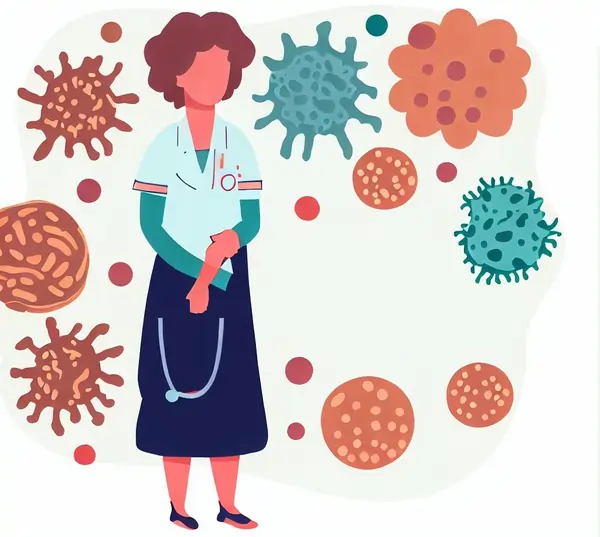Immunological Disorders: What Nurses Should Know

In the ever-evolving field of healthcare, nurses play a critical role in understanding and managing various medical conditions, including immunological disorders. With the increasing prevalence of these disorders, nurses must possess comprehensive knowledge to provide the best possible care to patients. This blog, tailored for students and healthcare professionals, explores the world of immunological disorders and offers guidance on how students can effectively do their assignments in this complex subject area. If you need help with your nursing assignment, this resource will provide valuable insights to assist you.
Understanding Immunological Disorders
Before delving into the specifics of immunological disorders, it's essential to grasp the fundamentals of the immune system. The immune system is a complex network of cells, tissues, and organs that work together to defend the body against harmful invaders, such as bacteria, viruses, and other pathogens. However, this intricate defense mechanism can sometimes malfunction, leading to immunological disorders.

Types of Immunological Disorders
Immunological disorders can be broadly categorized into four main groups:
- Immunodeficiency Disorders:
- HIV/AIDS (Human Immunodeficiency Virus/Acquired Immunodeficiency Syndrome): HIV is a virus that specifically targets and attacks the immune system's CD4 T cells. As a result, the body's ability to mount an effective immune response is severely impaired. Without proper treatment, HIV infection can progress to AIDS, where the immune system is so weakened that the individual becomes susceptible to opportunistic infections and certain cancers. Nurses play a crucial role in educating patients about prevention, treatment, and managing the complications of HIV/AIDS.
- Primary Immunodeficiency Disorders: These are a group of rare genetic disorders where individuals are born with a defective or absent immune system. Examples include severe combined immunodeficiency (SCID), common variable immunodeficiency (CVID), and X-linked agammaglobulinemia. Nurses caring for patients with primary immunodeficiency disorders must be vigilant in preventing infections, monitoring immune function, and administering appropriate treatments, such as immunoglobulin replacement therapy.
- Autoimmune Disorders:
- Rheumatoid Arthritis: This autoimmune disorder primarily affects the joints, leading to chronic inflammation, pain, and joint damage. Nurses working with rheumatoid arthritis patients may assist in pain management, monitor disease progression, and educate patients about medication management and lifestyle modifications.
- Lupus (Systemic Lupus Erythematosus): Lupus is a systemic autoimmune disease that can affect multiple organs, including the skin, joints, kidneys, heart, and lungs. Nurses are essential in helping patients manage their symptoms, understand the importance of sun protection, and adhere to prescribed medications, which often include immunosuppressants.
- Multiple Sclerosis (MS): MS is an autoimmune disorder where the immune system attacks the protective covering of nerve fibres (myelin) in the central nervous system. Nurses play a critical role in supporting patients with MS, addressing mobility issues, and providing emotional support as patients navigate the unpredictable nature of the disease.
- Allergic Disorders:
- Hay Fever (Allergic Rhinitis): Hay fever is characterized by sneezing, runny nose, and itchy eyes in response to pollen, dust mites, or pet dander. Nurses can educate patients about allergen avoidance, recommend antihistamines, and assist in managing symptoms.
- Asthma: Asthma is a chronic allergic disorder that affects the airways, causing wheezing, shortness of breath, and coughing. Nurses may help patients develop asthma action plans, teach proper inhaler techniques, and monitor lung function.
- Food Allergies: Food allergies trigger immune responses when specific foods are consumed. Nurses must educate patients about allergen avoidance, recognize and manage anaphylactic reactions, and support individuals in managing their dietary restrictions.
- Hypersensitivity Disorders:
- Type I Hypersensitivity (e.g., Anaphylaxis): This is an immediate and severe allergic reaction that can occur within minutes of exposure to an allergen, such as peanuts or bee stings. Nurses must be trained to recognize the signs of anaphylaxis and administer epinephrine promptly to save lives.
- Type II, III, and IV Hypersensitivity Reactions: These reactions involve different mechanisms and are associated with conditions like autoimmune hemolytic anaemia (Type II), immune complex diseases (Type III), and delayed-type hypersensitivity reactions like contact dermatitis (Type IV). Nurses play a role in managing these conditions, often by administering specific treatments and monitoring patient responses.
Immunodeficiency disorders are conditions characterized by a weakened or compromised immune system. The immune system's primary function is to protect the body from infections by recognizing and eliminating harmful pathogens like bacteria, viruses, and fungi. However, in individuals with immunodeficiency disorders, this defense mechanism is impaired, leaving them more vulnerable to infections.
Autoimmune disorders occur when the immune system mistakenly targets and attacks the body's healthy tissues and cells. This happens because the immune system fails to recognize "self" from "non-self," leading to inflammation and damage to various organs and systems.
Allergies are immune responses to substances that are typically harmless but are perceived as threats by the immune system. When exposed to allergens, the immune system overreacts, leading to allergy symptoms.
Hypersensitivity disorders involve exaggerated immune responses to substances that are typically harmless. They are categorized into four types, with Type I hypersensitivity being the most severe. These reactions can range from mild discomfort to life-threatening emergencies.
The Role of Nurses in Managing Immunological Disorders
Nurses are on the front lines of patient care, and they play a pivotal role in managing immunological disorders. Here's what nurses should know and do:
- Comprehensive Assessment: Nurses must conduct thorough assessments to identify signs and symptoms of immunological disorders. This includes taking a detailed patient history, performing physical examinations, and interpreting diagnostic tests.
- Medication Management: Many patients with immunological disorders require medications to manage their conditions. Nurses must be well-versed in the administration and monitoring of these medications, including potential side effects.
- Patient Education: Educating patients about their conditions and the importance of adherence to treatment plans is crucial. Nurses can help patients understand their disorders, medications, and lifestyle modifications.
- Supportive Care: Providing emotional support and addressing the psychosocial aspects of living with an immunological disorder is a vital aspect of nursing care.
Approaching Assignments on Immunological Disorders
Students often need to complete their nursing assignments related to immunological disorders. Here are some tips to excel in these assignments:
- In-Depth Research: Start by conducting thorough research on the specific immunological disorder you're studying. Gather information from reputable sources such as textbooks, peer-reviewed journals, and authoritative healthcare websites.
- Organized Structure: Create a well-structured outline for your assignment. Begin with an introduction that provides context and defines the disorder. Follow this with sections on causes, symptoms, diagnosis, treatment, and nursing care.
- Case Studies: Incorporating real-life case studies can add depth and relevance to your assignment. Analyze how nurses played a crucial role in the care and management of patients with specific disorders.
- Current Guidelines: Ensure that your assignment reflects the latest guidelines and advancements in the field of immunology and nursing. Stay updated with recent research and developments.
- Citation and Referencing: Properly cite all sources used in your assignment following the appropriate citation style (e.g., APA, MLA). This demonstrates academic integrity and avoids plagiarism.
Conclusion
Immunological disorders are a significant aspect of nursing practice in advanced immunology. Nurses must possess a strong understanding of these disorders and their management to provide high-quality patient care. For students, effectively approaching assignments in this area requires in-depth research, organization, and adherence to academic standards. As you dive into the world of immunological disorders, remember that your knowledge and dedication will make a meaningful impact on the healthcare field.If you have further questions or need assistance with specific topics related to immunological disorders, consider paying someone to write your nursing assignment for guidance or utilizing reputable academic resources. As you continue to develop your expertise in advanced immunology, your contributions to patient care will become increasingly valuable.